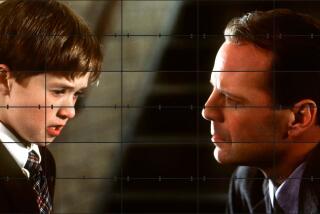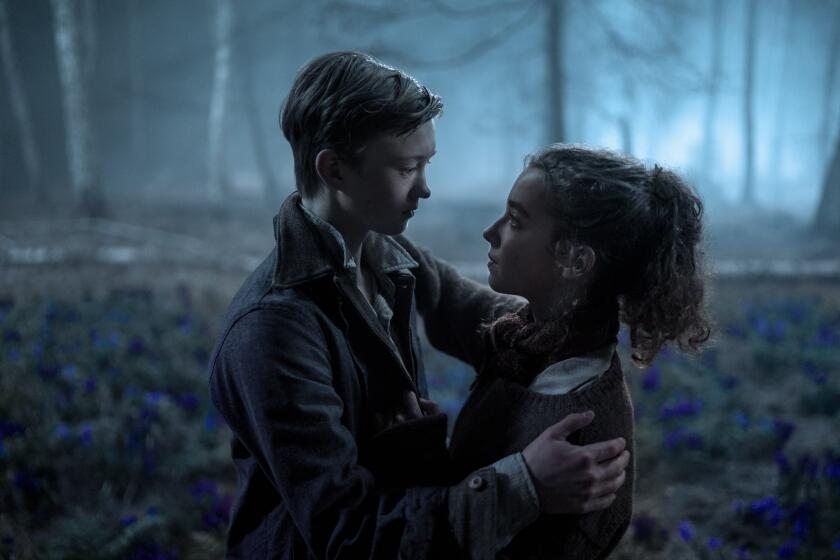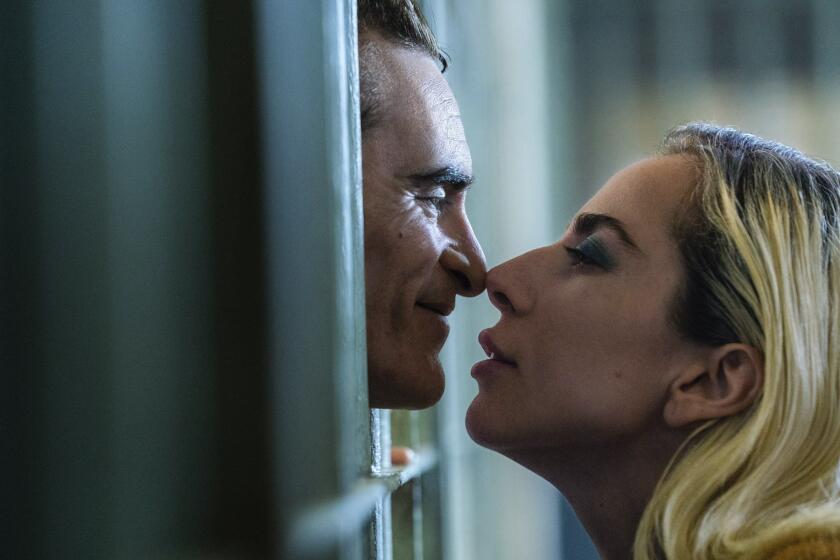‘Menace II Society’ Filmmakers Going to Disney Land
Talk about an odd couple.
Allen and Albert Hughes, the 21-year-old twins who have successfully moved into the Hollywood ‘hood with their hard-edged urban drama “Menace II Society,” have agreed to join hands with the traditionally conservative Walt Disney Co.
They are doing so under a new two-picture deal with Joe Roth’s Disney-based production company Caravan Pictures, assuring them creative control over their projects.
In a phone interview Monday, the Hughes brothers joked about the notion of their being in business with such a mainstream company, even though Disney recently has attempted to change its image and diversify its projects by aligning itself with several independent movie companies.
“Wouldn’t good ol’ Walt turn in his grave if he saw this?” quipped Allen Hughes, to which brother Albert added, “It’s the ultimate revenge on Hollywood . . . instead of beating us they (Disney) are joining us.”
While the hot filmmakers are being formally validated by the upper echelon of the movie industry, the brothers are also pursuing major deals in music and TV. Their personal manager, Darryl Porter, who will head their new production company, Underworld Pictures, confirmed that negotiations are under way with front-runner Columbia Records to distribute soundtrack and straight music albums produced by the twins on their own label. They are also talking with Disney regarding a potential TV deal, he said.
It was Roth--the former chairman of 20th Century Fox--who was the linchpin in making the movie deal for Disney with the Hugheses, who were wooed by nearly every major film studio.
The twins acknowledged an initial reluctance in dealing with Disney when they were first approached by studio chairman Jeffrey Katzenberg. He turned to Roth, himself a former independent filmmaker, who persuaded the twins to make a deal with Caravan, assuring them they could keep their creative autonomy and at the same time utilize Disney’s expertise and resources to market and distribute their movies.
The agreement with Roth and his producing partner, Roger Birnbaum, calls for the twins to make two low-budget movies over the next three years. The filmmakers are obligated to make their next picture for Caravan but have the right to make the following one for another party before returning for a second film with Caravan.
First to roll will be “Public Enemiez,” described by the brothers as a political action movie about four drug dealers who travel from Long Beach to New Orleans and become scapegoats for a profitable U.S. government-run drug distribution operation. Tyger Williams, who wrote and co-produced “Menace II Society,” is writing the script based on the Hugheses’ idea. The twins hope to begin shooting in November or December. Roth said he’d like to have the film ready for release next summer.
The Hugheses said other projects they would like to work on include biographical movies on boxer Joe Louis and rocker Jimi Hendrix.
Roth assured the filmmakers that they “will have creative control of their projects” and that Caravan could “protect” that right as long as they abide by the agreement, which includes Disney’s restrictions of staying on budget and making films under two hours that are not rated NC-17.
Roth said it will be the job of Caravan “to assist them and make sure their own vision isn’t tampered with.” The films will be marketed by Disney--with creative contributions guaranteed to the filmmakers--and distributed through Disney’s Buena Vista Pictures Distribution.
“They’re experts on selling things, but we’re going to be included in every marketing meeting and be involved at every stage of the game,” Allen Hughes said, insisting, “That’s what we’re about--marketing.”
Allen Hughes said when he and Albert were at the Cannes Film Festival and heard that Disney had bought Miramax Films--run by the fiercely independent Bob and Harvey Weinstein--”we were shocked and thought it may not be a good move in the way of independents.” Last year Disney also made a deal with the highbrow independent movie company Merchant Ivory Prods, run by producer Ismail Merchant and director James Ivory.
After sitting down with Roth and Katzenberg, Allen Hughes said he and his brother found “they were the only ones who offered the most creative control. . . . We sat down with every distribution company in town except Paramount and they wanted a certain amount of creative control and were quick to say they were scared to make the films we wanted to make. They were acting more like Disney than Disney.”
Allen admitted that two years ago “we said Disney was the last place we’d ever end up.”
In fact, two years ago when the brothers made their first entree into show business, it was through a music video deal for hip-hop artist Raw Fusion with Disney’s Hollywood Records, whose movie division, Hollywood Pictures, passed up the opportunity to make “Menace II Society.”
“They definitely did not want to make the picture,” said Albert Hughes, allowing that “nobody believed in us then but New Line.”
Allen Hughes added that when he and Albert sat down with Roth two weeks ago to discuss a possible deal, they were impressed: “The vibes were really good. He’s sincere and honest and you don’t find that very much in this town.”
While the brothers declined to discuss what budget restrictions they are under (a source at the studio said the pictures will likely cost around $10 million), they said they have no desire to make big-budget movies. Said Allen Hughes: “We don’t want to go out there and start flopping around.”
Roth, who first met the Hughes brothers in January, said that he was “really impressed at how savvy they were at 21 years old.” After seeing “Menace,” which reminded him of Martin Scorsese’s “Mean Streets,” he found “their vision is honest and direct and yet their filmmaking is very sophisticated.”
While “Menace II Society” has grossed an impressive $24.8 million at the box office so far, it is conceivable that the film may have reached an even broader audience with a bigger distribution company--like Disney.
More to Read
Only good movies
Get the Indie Focus newsletter, Mark Olsen's weekly guide to the world of cinema.
You may occasionally receive promotional content from the Los Angeles Times.






